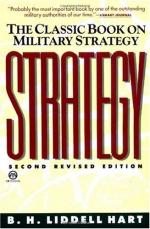
|
| Name: _________________________ | Period: ___________________ |
This quiz consists of 5 multiple choice and 5 short answer questions through Grand Strategy.
Multiple Choice Questions
1. According to the author, it is critically important to do what to every soldier in a military force?
(a) Psychologically condition them.
(b) Maintain their individuality.
(c) Equip and protect them.
(d) Train them to be leaders.
2. What is the most essential factor in concentrating forces?
(a) Hiding the concentration from the enemy.
(b) Providing ample supplies.
(c) Keeping communications open.
(d) Maintaining the chain of command.
3. Who led the second Persian invasion of Greece?
(a) Themistocles.
(b) Xerxes.
(c) Belasarius.
(d) Darius the Great.
4. Fabius was famous for what tactic?
(a) Guerilla warfare.
(b) Forestalling engagements until the proper time.
(c) Forcing the enemy to attack.
(d) Employing highly mobile light forces.
5. Which of the following historical commanders did NOT enjoy supreme power in both military and political matters, as did Hitler?
(a) Hannibal.
(b) Alexander.
(c) Napoleon.
(d) Caesar.
Short Answer Questions
1. What factor did Constable du Guesclin rely upon in enemy territory?
2. How does the author define "Grand Strategy"?
3. What historical general is cited as basing his conquests on popular support?
4. William's ally attacked England from which direction?
5. According to the author, how should formations be arranged?
|
This section contains 254 words (approx. 1 page at 300 words per page) |

|




